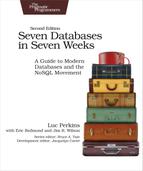Why a NoSQL Book
What exactly does the term NoSQL even mean? Which types of systems does the term include? How will NoSQL impact the practice of making great software? These were questions we wanted to answer—as much for ourselves as for others.
Looking back more than a half-decade later, the rise of NoSQL isn’t so much buzzworthy as it is an accepted fact. You can still read plenty of articles about NoSQL technologies on HackerNews, TechCrunch, or even WIRED, but the tenor of those articles has changed from starry-eyed prophecy (“NoSQL will change everything!”) to more standard reporting (“check out this new Redis feature!”). NoSQL is now a mainstay and a steadily maturing one at that.
But don’t write a eulogy for relational databases—the “SQL” in “NoSQL”—just yet. Although NoSQL databases have gained significant traction in the technological landscape, it’s still far too early to declare “traditional” relational database models as dead or even dying. From the release of Google’s BigQuery and Spanner to continued rapid development of MySQL, PostgreSQL, and others, relational databases are showing no signs of slowing down. NoSQL hasn’t killed SQL; instead, the galaxy of uses for data has expanded, and both paradigms continue to grow and evolve to keep up with the demand.
So read this book as a guide to powerful, compelling databases with similar worldviews—not as a guide to the “new” way of doing things or as a nail in the coffin of SQL. We’re writing a second edition so that a new generation of data engineers, application developers, and others can get a high-level understanding and deep dive into specific databases in one place.
